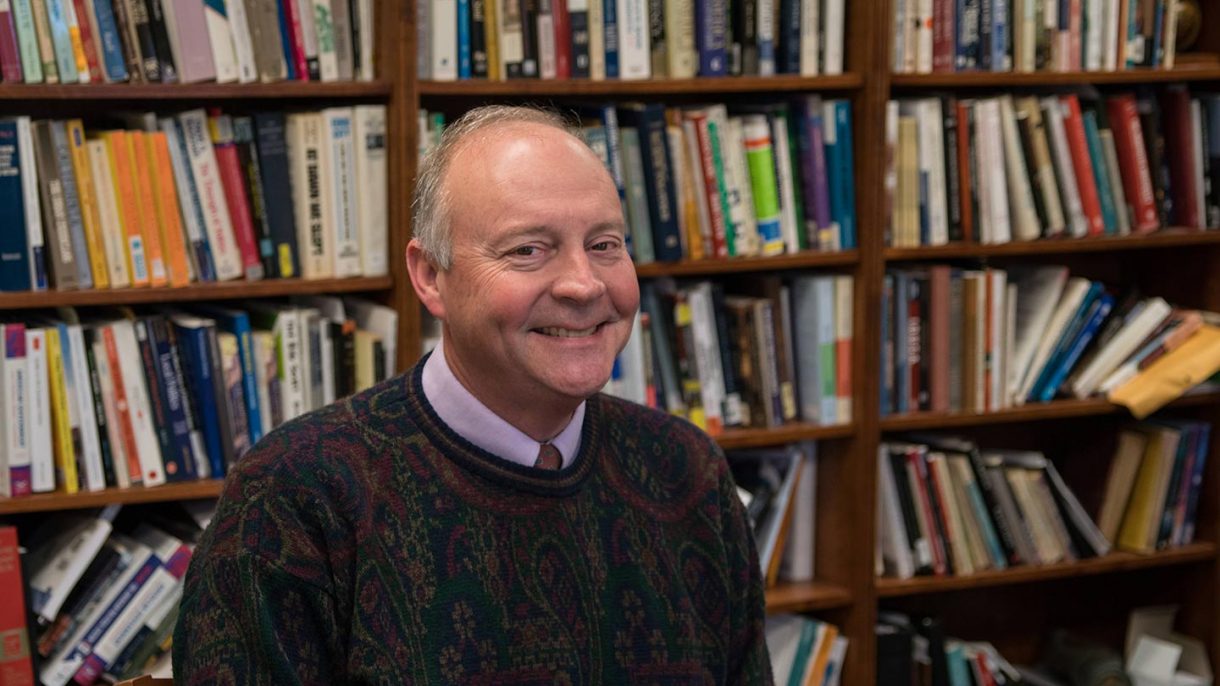
Dr. Steve Clements ’83
Originally published in Winter 2019
It’s been a busy year for Dr. Steve Clements ‘83. Between running the newly-minted Joe Pitts Center for Public Policy at Asbury University — and holding positions as both associate professor of Political Science and dean of the College of Arts & Humanities — it’s safe to say that Clements doesn’t stop running.
The Joe Pitts Center for Public Policy officially opened last March during an inauguration ceremony with former U.S. Representative Joe Pitts ’61 and his family in attendance. Following the ceremony, the Center hosted its first event, a conference on the opioid crisis.
Since, Clements has been busy organizing events for the Center including an Ambassadors Roundtable, a midterm election discussion panel, a senatorial debate and an oral argument session with local judges.
As events continue to be executed, Clements’ excitement builds while he dreams up and examines what the future of the Center could look like.
Currently, Clements is making a distinctive effort to establish three to four Pitts Center events per semester.
As part of the new programming, he’s also planning a leadership intensive in Washington, D.C., scheduled for May, in which 10 to 12 students will visit the nation’s capital to tour historical sites, meet with professionals and discuss policy issues. Additionally, Clements runs the Washington Federal Seminar trip each January, a program which Asbury has taken part in for many years. Clements is always happy to return to the city he called home in the late 1980s and especially enjoys the chance to see it through his students’ eyes.
Another arm that may potentially grow in the Center’s future would include taking on analytic projects through contracts and grant funding. These opportunities are often considered staples of public policy centers and would give upperclassmen the chance to gain hands-on work experience in the field of data analysis.
In the midst of this flurry of activity, what’s been most rewarding for Clements is seeing his students expand their worldviews through Asbury’s Political Science coursework, something which he hopes will extend to the wider Asbury campus community through Pitts Center activities.
“It’s [rewarding to] watch these students mature over the years in terms of their writing abilities, argumentation skills and thoughtfulness as they think about the future,” Clements said. “We’ll get a lot of freshmen who come in with pretty clear ideological blinders on. You can’t go through a run of courses over the span of several years without realizing that the picture is almost always more complicated than the blinkered perspective that you came in with. I’m not saying that I see a lot of massive shift in the thinking of students, but just to go from freshman to senior and to get them to think more historically, contextually and philosophically about what’s going on, that gives me hope.”
In addition to Pitts Center events, Clements keeps busy working on research pursuits. Most recently, he published a paper in collaboration with Dr. Kevin Brown, former associate dean and professor of the Dayton School of Business at Asbury. The duo has collaborated on several essays for the American Enterprise Institute’s “Values in Capitalism” project. For this year’s essay contest, they wrote about the future of liberalism.
“We’re talking about liberal political institutions and modes of government like in the United States and most European countries,” Clements said. “[It’s] this notion that government ought to be constructed around protecting freedom and rights of individuals, rather than having individuals and communities support a government no matter what it does.”
In the digital age, we’ve become accustomed to overwhelming amounts of political news. While the modern phenomenon may be exhausting, Clements, from his unique perspective as a political science professor, offers a simple solution that draws upon the ways of yesteryear.
“This is probably not popular advice but I would actually stay away from Twitter and some of the newsfeeds that are just constant because, first of all, that’s very distracting,” Clements said. “Second of all, it’s hard to evaluate any of that because it is just being dumped in your lap. If you can exercise a little restraint and wait until the next day, check and follow some of the major national newspapers. You can allow the system that we had for a long time to help you out. The temptation, because there’s so much stuff constantly being pushed out there, is to look at everything or to look at nothing.”
Clements is energized by the increasing amount of civic interest students have displayed on campus in recent years and has high hopes that the Pitts Center will provide a space for all students, regardless of major, to come and further engage in the political realm.
“I’d like to have the kind of environment here through the Political Science program and the Pitts Center that allows them to feel like they’ve had an undergraduate experience that gives them great opportunities to understand the different modes of thought and ideologies from people across the political spectrum,” Clements said.